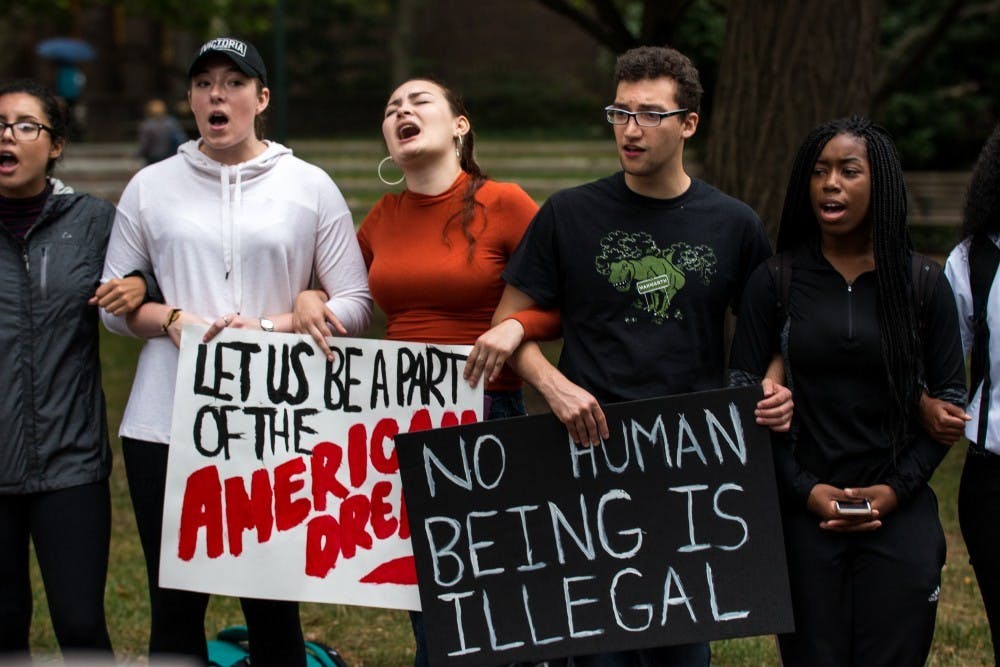
Since the beginning of the Trump administration, students and faculty at Penn have kept a close watch on shifts in United States immigration policy. Now, another recent change has sparked worry on campus.
Throughout November, the Trump administration has announced the ending of the Temporary Protected Status program for various countries, which has allowed thousands of immigrants to live and work in the United States for decades.
TPS was never intended to lead to citizenship, but rather to allow migrants from several designated countries — such as Honduras, El Salvador, Nicaragua, and Haiti — to flee natural disasters or internal conflicts.
Because each of these countries entered the TPS program in different years, immigrants from different countries have been given different end dates. On Nov. 21, approximately 59,000 migrants from Haiti were told that they were being given 18 months to leave the country, prompting widespread panic within that community. On Nov. 6, close to 5,000 migrants from Nicaragua were told that they have to leave the country in 14 months, though a similar deadline has yet to be set for those from Honduras.
One College junior, who has multiple relatives from El Salvador that are protected by TPS and wants to remain anonymous, said in the wake of this policy shift, he has had to struggle silently as a student but also as a provider for his family.
“I have to personally reach out to them to help them with their cases,” he said. “I kind of educate them with what’s going on. Sometimes it’s hard to tell people there’s nothing they can do about their status, even if they’ve done everything right. Even if they have a job, or have kids.”
The College junior talked about having to work 40 hours a week and having to translate various documents for his parents, all while juggling the demands of being a Penn student.
“It’s hard to reach out to anyone,” he said. “You’re kind of trained to do everything yourself. When these issues come up at home, people at Penn aren’t familiar with them, so they can’t help you maneuver them. Even if they want to, they’re so complicated and personal.”
Political Science professor Michael Jones-Correa, who serves as director of the Center for the Study of Ethnicity, Race, and Immigration, said as a policy, TPS is interesting because people who have benefited from it have been living in the United States for decades and at this point often consider themselves American.
Jones-Correa said the Trump administration has been signaling toward radical changes in immigration.
He said the administration is looking at the formation of a point system, similar to the one used in Canada, which focuses on education and skill sets rather than the importance of family ties, “which has been the bedrock of the American immigration system since the 1950s.”
“These are all pretty dramatic changes in U.S. immigration policy,” Jones-Correa said. “Generally very different from the immigration policies followed by either Republican or Democratic administrations since 1965.”
Penn has been consistent in showing its support for students affected by these changes, Jones-Correa said, but faculty and administrators have also had to “act within the bounds of the law.” He added that professors have been holding teach-ins and legal workshops for students directly affected by changes in immigration policy, with one of the next major University-wide events taking place next March.

College sophomore and Media Liaison for Penn for Immigrant Rights Erik Vargas said he has noticed that there has not been much conversation on campus surrounding TPS as compared to the repeal of the Deferred Action for Childhood Arrivals policy. He added that this is likely due to the fact that there is a smaller population of students with family from the designated countries.
However, Vargas also said that Penn has provided resources for community members affected by a range of immigration-related changes, from the repeal of DACA and TPS to the institution of various travel bans.
“There’s been support from [Counseling and Psychological Services]," Vargas said. “We’ve been working closely with them. In the beginning of the year, if you wanted to schedule a CAPS appointment it was like a two-week wait. So if you’re directly affected by this, it is priority. If you make an appointment, you get it the next day. That’s been good institutional help.”
The Daily Pennsylvanian is an independent, student-run newspaper. Please consider making a donation to support the coverage that shapes the University. Your generosity ensures a future of strong journalism at Penn.
Donate







